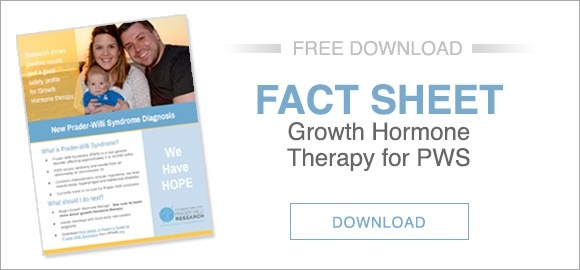Several new reports on growth hormone (GH) therapy support the benefits of GH use in PWS, while continuing the trend of a reassuring safety profile.
A study from Carrel et al [Long-Term Growth Hormone Therapy changes the Natural History of Body Composition and Motor Function in Children with PWS] is a follow up to a study of GH in young children [Carrel et al, 2004], which first reported improved mobility and body composition in young children who had started GH as infants or toddlers. Now these kids are ~ 6 years old, and the investigators have compared them to another group of children, matched for age, who had not received GH. Out of necessity, the data for the non-GH PWS group was previously collected; almost all young children in the US now receive GH, so it’s now (thankfully!) hard to find kids with PWS at age 6 who have not received this intervention. Looking at a battery of tests including height, body fat, “good” and “bad” cholesterol, motor strength and agility, those kids taking GH from a young age came out on top for all measures. Given the magnitude of the benefit (highly significant), and the good safety profile, the authors conclude that GH therapy, started in infants, significantly changes the natural history of PWS in a beneficial and clinically meaningful way.
Another new study by de Lind van Wijngaarden and colleagues [Efficacy and safety of long-term continuous growth hormone treatment in children with Prader-Willi syndrome] followed 55 children in the Netherlands over 4 years of GH therapy. Height increased and became similar to peers and body composition improved, with less body fat and stabilized lean body mass. No deleterious effects were noted. An additional study by the same group looked specifically at the risk of scoliosis associated with GH therapy in PWS. That study [Randomized controlled trial to investigate the effects of growth hormone treatment on scoliosis in children with Prader-Willi syndrome] compared children on GH to those who did not receive GH, and saw no difference in the rate or severity of scoliosis. They conclude (as others have previously Nagai, 2006) that scoliosis is not a reason to stop or change GH therapy.
Finally, Long-term safety of recombinant human growth hormone in children [Bell, 2010] is a huge “post-marketing†safety study, following almost 50,000 children who received growth hormone between 1985 and 2006. Only about 1% of these kids were on GH because they had PWS, the remainder growth hormone deficiency due to a variety of medical issues: therapy for tumors in which radiation had damaged the pituitary gland, genetic conditions such as Turner’s syndrome, idiopathic short stature (ie, short, but otherwise normal kids), etc. A major concern when GH first came into clinical use in children was that it would increase the risk of cancer, with most concern focused on leukemia, which is comparatively common in children. This study does not support that concern; slightly less than the expected number of children in this large group developed leukemia (3 cases observed, 5.6 expected in such a large group of kids). For those children who have previously had cancer, there may be an elevated risk of cancer recurrence with GH, which is consistent with previous reports. Of kids with PWS in the study, 2 out of the 511 died while using GH. These cases have been previously reported and were associated with upper respiratory infections/respiratory impairment. Overall, this study supports the previous recommendation that children with PWS be evaluated for respiratory difficulties prior to starting GH [Miller 2009].
In summary, these studies add to the body of literature supporting the benefits and general safety of early, carefully monitored, use of GH throughout infancy and childhood in those with PWS.
Learn more about the importance of growth hormone therapy for PWS.








